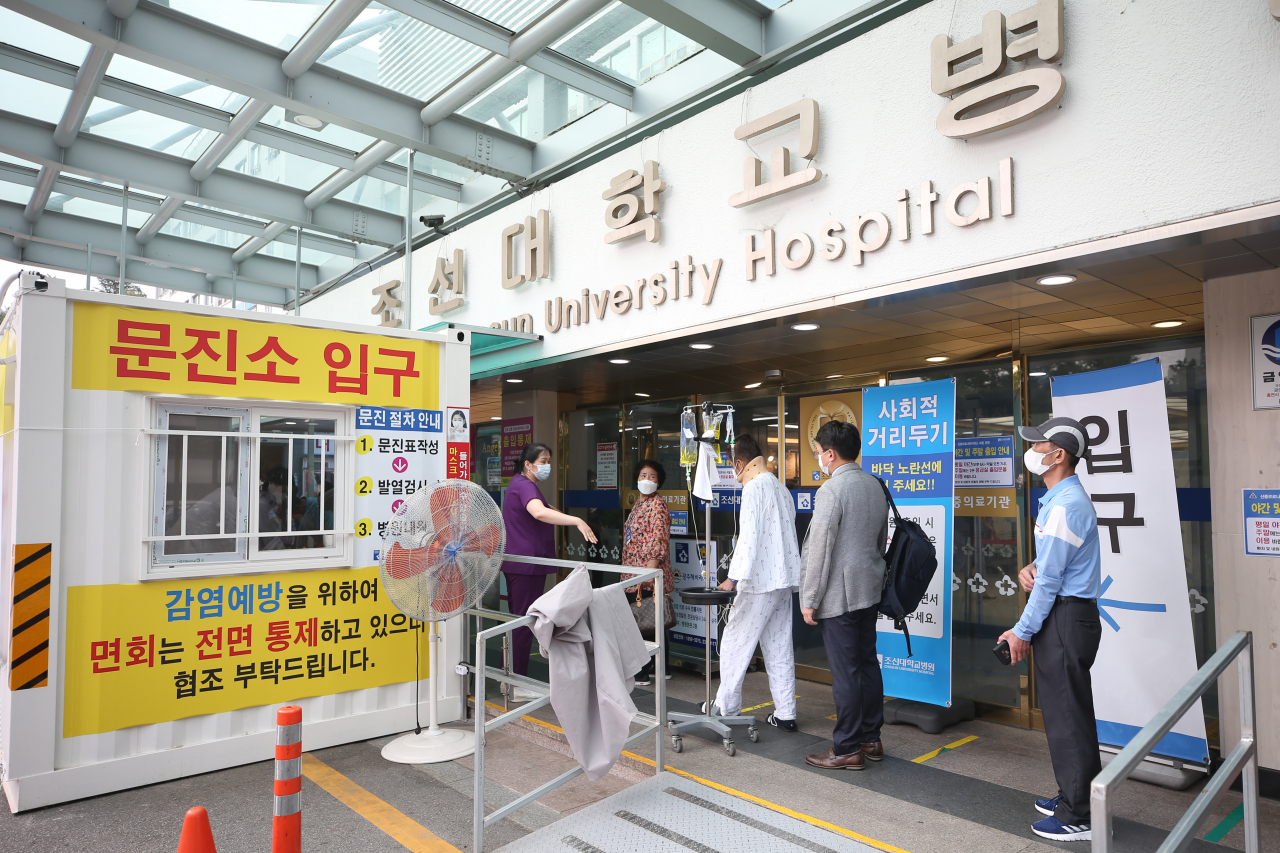
Concerns are mounting in Gwangju that it could emerge as a new hotbed for the spread of the new coronavirus, as sporadic infections continue to grow in the southern city with a population of 1.5 million.
Of 54 new daily cases reported in South Korea on Thursday, Gwangju registered 22 new cases with a recent surge in COVID-19 infections related to small gatherings in churches and a Buddhist temple following its first double-digit rise of 12 on Wednesday.
Health Minister Park Neung-hoo said the transmission rate in the city is “alarming” and the rising trend should be flattened immediately.
“It only took a week for the daily caseload to grow from 20 to 200 when reflecting our experience in Daegu in February,” Park said.
The city of Daegu has reported the largest number of accumulated infections of some 6,910 which were mainly traced to a religious cult, the epicenter of the country’s virus outbreak.
Thirty more cases linked to the Buddhist temple of Gwangreuk in Gwangju were detected on Thursday, taking the total to 49, according to the Korea Centers for Disease Control and Prevention.
Visitors to the temple were found to have transmitted the contagious disease to others when they contacted people during a group meeting, religious gatherings and door-to-door businesses.
The government is currently considering designating religious facilities as high-risk sites, as churches and temples have persistently been hubs for outbreaks. If designated, those facilities will be required to keep a visitor log using quick-response codes.
“Religious facility-related infections rarely occur during regular worship services but they pop up during small gatherings (among congregation members) when they have meal together, sing hymns and pray out loud. Cases related to such activities were also found in Gwangju,” said Son Young-rae, an official with the Central Disaster and Safety Countermeasure Headquarters.
Speaking to reporters on Thursday, Gwangju Mayor Lee Yong-sub stressed that the city is in critical situation where the shortage of hospital beds could be imminent given the trend of rising infections.
“Because those who have come in close contact with the ones who tested positive are also increasing, we are facing an absolute scarcity of doctors, nurses, care workers and other medical professionals,” Lee said.
The city strengthened its social distancing measures to phase 2, banning indoor gatherings of over 50 people and outdoor gatherings of more than 100 people.
On June 28, the government introduced three-phased social distancing measures in order to provide clear and unified guidelines that the people can follow in sync with the number of daily-infected persons and the rate of untraceable cases.
For the next two weeks, operation of public and multiuse facilities such as libraries and museums as well as high-risk sites like internet cafes and karaoke bars will be suspended.
Gwangju Metropolitan Office of Education on Wednesday directed all elementary, middle and high schools in the city to move their classes online for Thursday and Friday. From July 6-15, schools are required to reduce the number of students in classrooms, capping the number of elementary and middle school students to one-third of the total student body and high schools to two-thirds.
The Central Disaster Management Headquarters said that the government and ministries would actively support Gwangju so that the city could make the most of its newly adopted measures relating to the elevation of social distancing regime.
Meanwhile, health authorities started the administration of Gilead Sciences’ antiviral drug remdesivir on two COVID-19 patients in critical condition on Thursday for the first time in the country. Some 31 more people will be treated with the first batch of the medication donated by the Korean unit of the US pharmaceutical company.
Health authorities will secure a free supply of remdesivir by end of this month and start to purchase the drug from next month at a price to be set through ongoing negotiations. The government will cover all expenses for the drug.
By Park Han-na (hnpark@heraldcorp.com)






![[KH Explains] How should Korea adjust its trade defenses against Chinese EVs?](http://res.heraldm.com/phpwas/restmb_idxmake.php?idx=644&simg=/content/image/2024/04/15/20240415050562_0.jpg&u=20240415144419)












![[Today’s K-pop] Stray Kids to return soon: report](http://res.heraldm.com/phpwas/restmb_idxmake.php?idx=642&simg=/content/image/2024/04/16/20240416050713_0.jpg&u=)